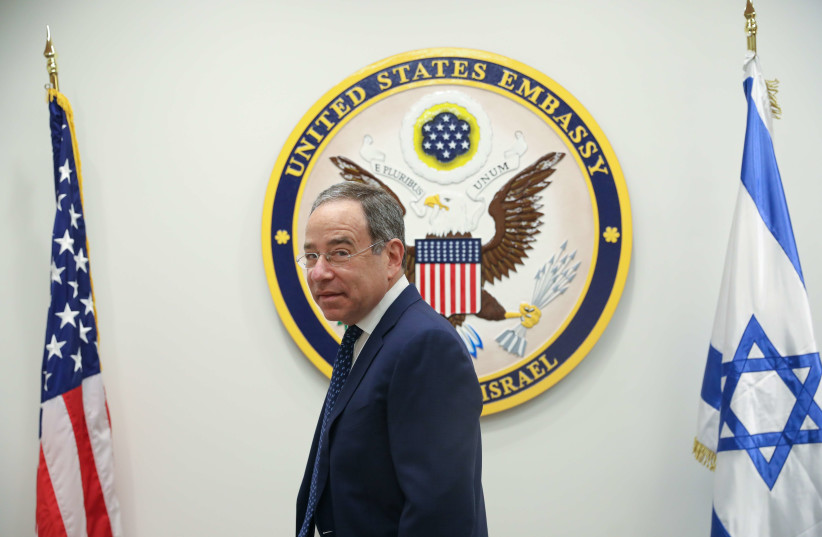The Biden Administration is working with Israel to limit West Bank settlement growth including in east Jerusalem, US Ambassador to Israel Tom Nides said on Wednesday morning.
“We do not support settlement growth. I made that position quite clear to the government, to all the players... including the prime minister,” said Nides in Jerusalem.
“We will continue working with the Israeli government to limit any settlement growth outside of green line Israel.”
Thomas Nides, US Ambassador to Israel
“We will continue working with the Israeli government to limit any settlement growth outside of green line Israel,” he continued.
The Biden administration has been clear from the start that it does not support Israeli settlement activity or Jewish building over the pre-1967 lines in Jerusalem.
Nides’s comments, however, made it clear that the US was actively urging Israel to hold back on such activity.

Israel has insisted that it has a right to build over the Green Line and the subject has been a source of tension between the two governments.
In New York later in the day, many of the 15 members of the United Nations Security Council spoke against settlement activity as they heard a report from the Special Coordinator for the Middle East Peace Process Tor Wennesland on the implementation of the 2016 Resolution 2334 that called on Israel to halt such activity.
US Ambassador to the UN Linda Thomas-Greenfield called on both Palestinians and Israelis to halt unilateral actions such as terror attacks and settlement activity, including recent plans to expand the Har Gilo settlement.
French Ambassador to the UN Nicolas de Rivière, whose country also holds the UNSC Presidency, called for an end to such activity. France is asking Israel “to put an end to the current procedures aimed at extending or establishing new settlements,” he said.
Aid for Palestinians
In Jerusalem, Nides spoke with the press at an event in which the US Agency for International Development announced $6.5 million for nongovernmental projects to benefit Palestinians through the US’s Middle East Partnership for Peace Act.
Nides clarified that the US plans to spend $500 million for Palestinians in 2022, including on the United Nations Relief and Works Agency for Palestinian Refugees.
To date, the Biden Administration has pledged $344m. to UNRWA, even as it weathers charges that some of the textbooks it uses in its classroom include material that is antisemitic material and or incites against Israel. UNRWA has said it has zero tolerance for antisemitism and has cracked down on such instances when they occur.
“We talk to UNRWA all the time. They need plenty of reforms. We have talked to them about their textbooks and their educational opportunities.
“But they do a lot of good work. It’s not perfect,” he said... adding that “we want to be in the game with them because we believe it's important.”
On the topic of the six Palestinian nongovernmental organizations that Israel declared to be terror groups, Nides said that the US was still reviewing Israeli evidence and had not made a determination.
Two-state solution
Nides lauded Prime Minister Yair Lapid’s speech at the UN last week in which he affirmed his support for a two-state resolution to the conflict. Nides noted that he had issued similar words when talking with US President Joe Biden in Jerusalem in July.
He was vague, however, when asked about Lapid’s refusal to meet with Palestinian Authority President Mahmoud Abbas.
“We encourage any bit of dialogue that occurs. Our hope is that it will lead to more conversations. We obviously encourage those conversations to happen. We support his [Lapid’s] continuation of the articulation of the hope of a two-state solution,” Nides said.
On Iran
On Iran, Nides said, that the US would not allow Iran “to have a nuclear weapon” and that “we will not tie Israel’s hands to defend itself and to do things they believe they need to do to protect Israel from Iran and it proxies.”
He spoke as the European Union's efforts to revive the 2015 Iran deal, known as the Joint Comprehensive Plan of Action, have hit a dead end.
Nides clarified that the US had given the EU its list of conditions for reviving the deal. “Those conditions have yet to be met.
“The ball is in Iran’s court to determine if they will meet the conditions we have set forth with the Europeans and until then no deal will be signed.”
